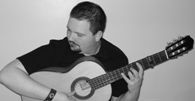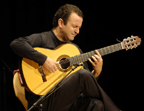Welcome to one of the most active flamenco sites on the Internet. Guests can read most posts but if you want to participate click here to register.
This site is dedicated to the memory of Paco de Lucía, Ron Mitchell, Guy Williams, Linda Elvira, Philip John Lee, Craig Eros, Ben Woods, David Serva and Tom Blackshear who went ahead of us.
We receive 12,200 visitors a month from 200 countries and 1.7 million page impressions a year. To advertise on this site please contact us.
|

|
|
ear training?
|
You are logged in as Guest
|
|
Users viewing this topic: none
|
|
Login  | |
|

   
NormanKliman
Posts: 1143
Joined: Sep. 1 2007

|
 RE: ear training? (in reply to henrym3483) RE: ear training? (in reply to henrym3483)
|
|
|
I agree: Transcribing is the best way to develop your skills in this regard. However, it's an activity that develops a number of skills that you might want to at least consider separately.
I might be misunderstanding what it is you're after, but "ear training" suggests to me the ability to analyze something upon listening to it. In order to do that, you have to be able to associate sounds with musical concepts (and not necessarily with fancy terminology).
They say that music consists of rhythm, melody and harmony, so you might want to think about what those things are before you start transcribing. Transcribing develops your ability to analyze these elements, so you don't have to be an expert on them before you work out your favorite alegrías, for example, but it's in your interest to give some thought to them beforehand.
Aside from those three elements, there are guitar techniques that have characteristic sounds: different rasgueado fingerings, doubling a note with an open string, playing a chord higher up the neck on the bass strings, etc.
About rhythm, you have to be able to clearly distinguish between eighths, triplets, sixteenths, quintuplets and sextuplets (and combinations of these values). This is something that you have to be able to hear clearly in your head or tap out with your fingers without any difficulty.
A fundamental part of understanding melody is recognizing the sound of different scales and the "color" provided by different notes. For example, in the context of A Phrygian, a Bb7 chord has an A flat note, which contrasts greatly with the A tonic, and an F7 chord has an E flat note, which is has its own peculiar sound. Music theory is very helpful, but you don't have to use the fancy terminology. Most guitarists, upon hearing that F7 in tangos might just think, "Oh, jaleos."
But this last example has more to do with harmony than melody. One way to develop melodic/harmonic analysis is to familiarize yourself with different combinations of two notes. For example, E-F is probably the smallest interval you can imagine and/or sing; E-Fsharp is the beginning of the major scale; E-G sounds like a minor chord; E-Gsharp sounds like a major chord; E-A sounds like you're tuning the guitar (open strings); etc. You can establish any series of names for these intervals, the idea is to associate them to the sounds.
Be sure to test yourself after you start to get the hang of it. Get someone to play two notes (separately) and, without looking, try to determine the interval between them. It's not as hard as it might seem.
This last bit of advice about the intervals is the kind of thing that you DON'T really need to work on BEFORE doing your own transcriptions. But I'd say that you will need to be familiar with time values and certain characteristic guitar techniques in order for the transcribing to go smoothly.
_____________________________
Be here now.
|
|
|
|
REPORT THIS POST AS INAPPROPRIATE |
Date Oct. 24 2007 12:20:43
 |
|
 New Messages New Messages |
 No New Messages No New Messages |
 Hot Topic w/ New Messages Hot Topic w/ New Messages |
 Hot Topic w/o New Messages Hot Topic w/o New Messages |
 Locked w/ New Messages Locked w/ New Messages |
 Locked w/o New Messages Locked w/o New Messages |
|
 Post New Thread
Post New Thread
 Reply to Message
Reply to Message
 Post New Poll
Post New Poll
 Submit Vote
Submit Vote
 Delete My Own Post
Delete My Own Post
 Delete My Own Thread
Delete My Own Thread
 Rate Posts
Rate Posts
|
|
|
Forum Software powered by ASP Playground Advanced Edition 2.0.5
Copyright © 2000 - 2003 ASPPlayground.NET |
6.298828E-02 secs.
|


 Printable Version
Printable Version







 New Messages
New Messages No New Messages
No New Messages Hot Topic w/ New Messages
Hot Topic w/ New Messages Hot Topic w/o New Messages
Hot Topic w/o New Messages Locked w/ New Messages
Locked w/ New Messages Locked w/o New Messages
Locked w/o New Messages Post New Thread
Post New Thread